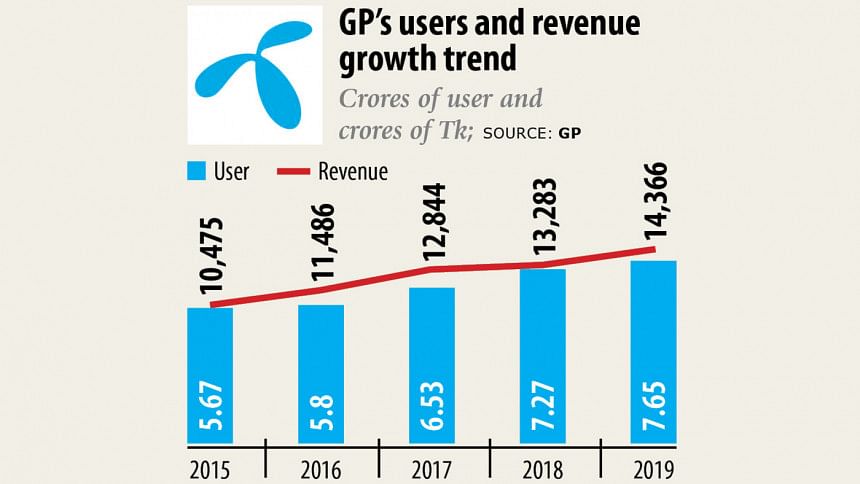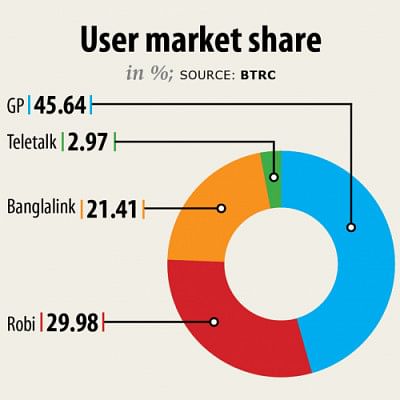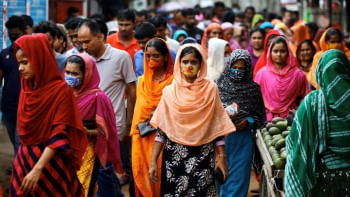BTRC imposes two restrictions on GP

The telecom regulator has imposed two new restrictions on Grameenphone. The move comes 16 months after it declared the country's leading mobile phone operator a significant market power (SMP).
According to the restrictions, Grameenphone will have to secure prior approval from the Bangladesh Telecommunication Regulatory Commission (BTRC) before rolling out any packages or offers.
The operator will also have to have all of its existing packages and offers validated by August 31. However, for new offers and packages, the directive will become effective on July 1.
The carrier would not be able to change or amend any of the conditions of approved packages or offers without consent from the commission.
The regulator has also made it easier for a subscribers to leave Grameenphone under the mobile number portability (MNP) facility.
Currently, if a user wants to switch to another network, they will have to stay with the new carrier for at least 90 days. But subscribers can now abandon Grameenphone after just 60 days.
The operator received the letter from the BTRC yesterday.
In February last year, the commission declared Grameenphone an SMP operator but did not follow through with the associated restrictions.
The telecom watchdog came up with four restrictions twice but Grameenphone challenged the conditions and processes at the High Court.
However, on December 15 last year, the High Court cleared the way for the telecom regulator.
The previous directive from the BTRC had contained four tough conditions but considering the ongoing Covid-19 pandemic, the regulator has chosen to go soft.
One of the four restrictions was to fix the minimum floor price on call charge at Grameenphone at Tk 0.50 per minute, which is currently Tk 0.45 for all operators.
The BTRC had also decided to increase the interconnection charge to Tk 0.15 per minute for Grameenphone. The rate is currently Tk 0.10.
Market insiders say the two restrictions that have not been implemented yet would increase the cost of services for end-users.
But the commission is unwilling to increase the cost of telecom services amid the coronavirus pandemic, said a top BTRC official.

"Actually, amid the Covid-19 outbreak, we have no intention to impose restrictions as all operators are serving customers at reduced charges following our request," said Md Jahurul Haque, chairman of the commission.
"It has been a long pending issue and we were getting pressure on that matter from other parties."
Perhaps this is the first SMP process in Bangladesh and that is why the BTRC moved slowly to observe the situation, he said.
The SMP issue surfaced after the recent emergence of a rift between Grameenphone and the three other operators.
On April 12, Robi, Banglalink and Teletalk asked for free spectrum for three months to serve their customers during the pandemic to handle the surge in data use. But the market leader opposed the free allocation.
The rift widened after Grameenphone in the first week of May offered 10 crore free minutes to 1 crore customers and monthly 30GB data to 25,000 doctors registered with the Directorate General of Health Services with a token Tk 1 per month for the next six months.
"The Bangladesh mobile telecom market is competitive and Grameenphone has grown through timely investment, innovations and operational efficiency," said Hossain Sadat, director for public and regulatory affairs at Grameenphone.
"The latest impositions deviate from the objectives of the SMP regulations and are not based on evidence of market failure," he said in a statement.
"These asymmetric impositions are anti-competitive in nature, which we believe are not in the interest of consumers and will have adverse impact on the national exchequer and the investment climate," Sadat added.
Grameenphone holds 45.64 per cent share of the subscriber base and more than 50 per cent revenue share.
According to the SMP guideline, the regulator can declare a carrier as an SMP operator if it controls more than 40 per cent share in any parameter.
The number of active subscribers at Grameenphone stood at 7.65 crore, earning the carrier Tk 14,366 crore by the end of 2019. It logged a record Tk 3,452 crore profit last year, the highest to date.
The telecom regulator has been working on the SMP issue since 2011. The BTRC formed a committee to devise a process to implement it.
The committee, in a guideline, recommended increasing the SMP operator's tariffs on both voice calls and data and imposing quality control parameters.
The regulation states that if an operator is found to have wage anti-market activities, the BTRC can step in to break the monopoly or oligopoly.
Any competitor can file a complaint against the SMP and the regulator will have to look into it.
The restrictions on Grameenphone are expected to give Robi a leg up in the market while Banglalink and, to a certain extent, Teletalk could also benefit.
Robi controls 29.98 per cent of the total subscriber base followed by Banglalink at 21.41 per cent and Teletalk at 2.97 per cent.
Declaring the dominant operator as an SMP is a common practice in the developed world and such regulations are also in place in India, Thailand, Singapore and Malaysia.

 For all latest news, follow The Daily Star's Google News channel.
For all latest news, follow The Daily Star's Google News channel. 



Comments